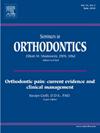Comparison of geometric changes in basal arch form after maxillary expansion between pure bone-borne and tissue-bone-borne appliance
IF 2
4区 医学
Q2 DENTISTRY, ORAL SURGERY & MEDICINE
引用次数: 0
Abstract
Attaining good occlusion, a key aspect of successful treatment, relies heavily on coordinating dental arch form. Therefore, achieving a coordinated basal arch form with acceptable tooth inclination becomes imperative. In this retrospective study, our objective was to explore changes in basal arch form and discern variations in expansion patterns during maxillary transverse discrepancy (MTD) correction between two types of bone-borne expanders: the ATOZ expander and the C-expander. The center of resistance (CR) points for the maxillary and mandibular first molars, first premolars, and lateral incisors were determined from cone-beam computed tomography (CBCT) data and CR arch form analysis was performed using 25 ATOZ group and 25 C-expander group. Our findings reveal that both the ATOZ expander and the C-expander effectively expand the maxillary premolar and molar regions. Particularly noteworthy is the superior expansion achieved by the ATOZ expander in the anterior region and CR-width ratio and CR-area ratio which showed more site-specific change in basal arch form after expansion in the ATOZ group. With the utilization of CR-arch form analysis to evaluate MTD throughout the entire arch, the ATOZ expander emerges as a viable option for patients requiring customized basal arch form changes after expansion.
纯骨性和组织-骨性矫形器在上颌骨扩张后基底牙弓形态几何变化的比较
良好的咬合是成功治疗的一个关键方面,它在很大程度上依赖于牙弓形态的协调。因此,实现协调的基底牙弓形态和可接受的牙齿倾斜度势在必行。在这项回顾性研究中,我们的目标是探索基底牙弓形态的变化,并辨别两种骨性扩弓器(ATOZ扩弓器和C-扩弓器)在上颌横向差异(MTD)矫正过程中扩弓模式的变化。通过锥束计算机断层扫描(CBCT)数据确定了上颌和下颌第一磨牙、第一前磨牙和侧切牙的阻力中心点(CR),并使用 25 个 ATOZ 组和 25 个 C-expander 组进行了 CR 弓形分析。我们的研究结果表明,ATOZ扩弓器和C-扩弓器都能有效扩弓上颌前磨牙和臼齿区。尤其值得注意的是,ATOZ扩弓器在前牙区的扩弓效果更佳,而CR-宽度比和CR-面积比则显示出ATOZ组扩弓后基底牙弓形态发生了更多特定部位的变化。利用CR-牙弓形态分析评估整个牙弓的MTD,ATOZ扩弓器成为需要在扩弓后定制基底牙弓形态变化的患者的可行选择。
本文章由计算机程序翻译,如有差异,请以英文原文为准。
求助全文
约1分钟内获得全文
求助全文
来源期刊

Seminars in Orthodontics
DENTISTRY, ORAL SURGERY & MEDICINE-
CiteScore
2.20
自引率
4.80%
发文量
28
审稿时长
10 days
期刊介绍:
Each issue provides up-to-date, state-of-the-art information on a single topic in orthodontics. Readers are kept abreast of the latest innovations, research findings, clinical applications and clinical methods. Collection of the issues will provide invaluable reference material for present and future review.
 求助内容:
求助内容: 应助结果提醒方式:
应助结果提醒方式:


